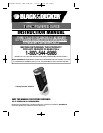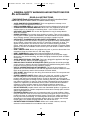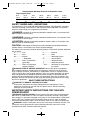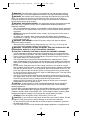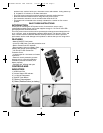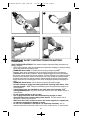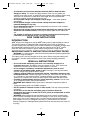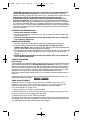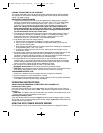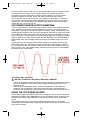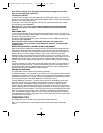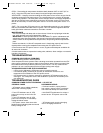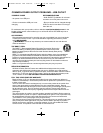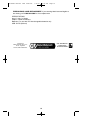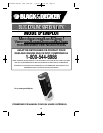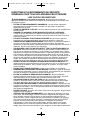
9
LEAVING THE BATTERY IN THE CHARGER
The charger and battery pack can be left connected indefinitely with the LED illuminated.
You may see the LED return to flashing (charging) state, as the charger will occasionally
“top off “ the battery charge.
IMPORTANT CHARGING NOTES
1 . Longest life and best performance can be obtained if the battery pack is charged
when the air temperature is between 65°F and 75°F (18°C- 24°C). DO NOT c h a r g e
the battery pack in an air temperature below +40°F (+4.5°C), or above +105°F
(+40.5°C). This is important and will prevent serious damage to the battery pack.
Note: The charger will not charge a battery pack if the pack temperature is
below approximately 32°F (0°C) or above 122F (50°C). The battery pack should
be left in the charger and the charger will begin to charge automatically when
the cell temperature warms up or cools down.
2 . The charger and battery pack may become warm to touch while charging. This is a
normal condition, and does not indicate a problem. To facilitate the cooling of the
battery pack after use, avoid placing the charger or battery pack in a warm
environment such as in a metal shed, or an uninsulated trailer.
3 . If the battery pack does not charge properly:
a . Check current at receptacle by plugging in a lamp or other appliance.
b . Check to see if receptacle is connected to a light switch which turns power off
when you turn out the lights.
c . Move charger and battery pack to a location where the surrounding air temperature
is approximately 65°F - 75°F (18°- 24°C).
d . If charging problems persist, take the tool, battery pack and charger to your
local service center.
4 . The battery pack should be recharged when it fails to produce sufficient power on jobs
which were easily done previously. DO NOT CONTINUE to use under these
conditions. Follow the charging procedure. You may also charge a partially used pack
whenever you desire with no adverse affect on the battery pack.
5 . Foreign materials of a conductive nature such as, but not limited to, steel wool,
aluminum foil, or any buildup of metallic particles should be kept away from charger
cavities. Always unplug the charger from the power supply when there is no battery
pack in the cavity. Unplug charger before attempting to clean.
6 . Do not freeze or immerse charger in water or any other liquid.
WARNING: Shock hazard.
Do not allow any liquid to get inside charger.
C A U T I O N :
Never attempt to open the battery pack for any reason. If the plastic housing
of the battery pack breaks or cracks, return to a service center for recycling.
TO MAXIMIZE BATTERY LIFE:
1 . Remove the batteries from the charger after the charging is completed.
2 . Store the batteries at room temperature or below.
3 . Recharge discharged batteries within 1 week. Battery life will be greatly diminished
if the battery sits too long after being discharged.
OPERATING INSTRUCTIONS
INSTALLING AND REMOVING THE BATTERY PACK (FIGURE D, E)
Installing the battery pack:
Insert the metal terminal end of the battery pack into the VPX power source until you
hear the lock snap into place and the V P X
TM
logo shows through the window as shown in
figure D.
CAUTION: The battery can only be inserted in one direction. If the battery does not fit,
remove and reverse the orientation. Do not force it.
Removing the battery pack:
Press the release button as shown in figure E and firmly pull the battery pack out of the
VPX power source. Insert the battery pack into the charger (figure B) as described in the
charger section of this manual.
HOW THE VPX POWER SOURCE WORKS
The VPX power source is an electronic device that converts low voltage DC (direct
90521888 VPX3101 1VPX Inverter 7/31/07 10:15 AM Page 9



